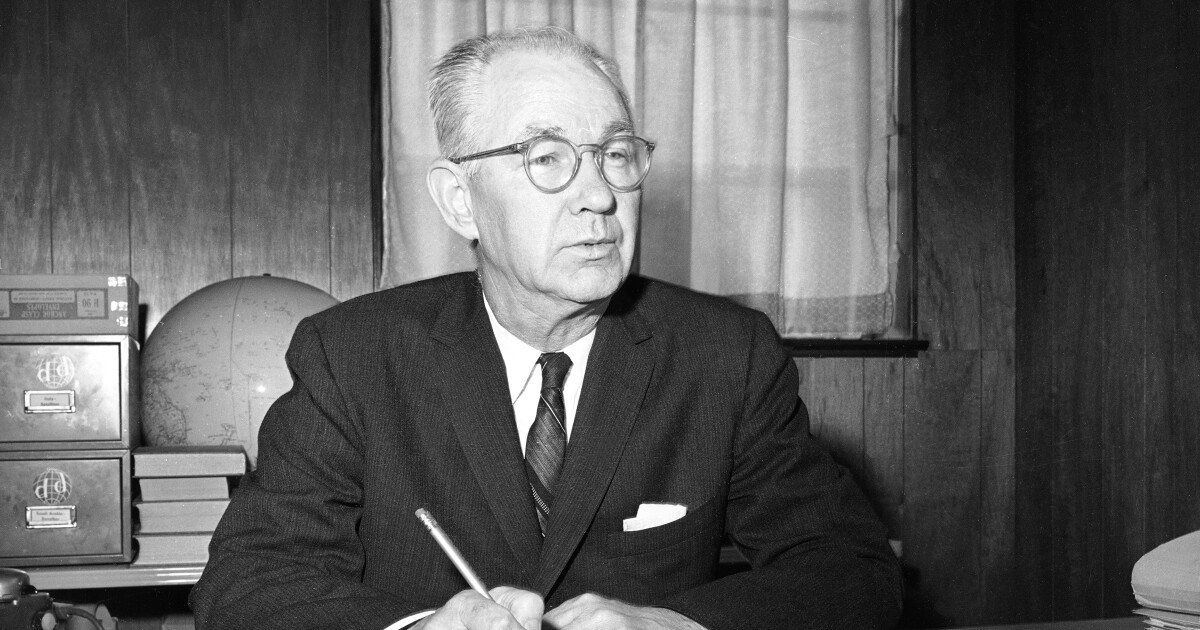Op-Ed: Today’s right-wing conspiracy theory mentality can be traced back to the John Birch Society

If you’re looking for the roots of today’s bizarre conspiracy-and-anger-driven politics, you need to look further back than the presidency of Donald Trump or even the rise of social media or talk radio — back to the accusatory, inflammatory, wild-eyed rhetoric of the John Birch Society in the 1960s and 1970s.
It’s beginning to fade into history, but the John Birch Society was once the most formidable anticommunist organization of the Cold War era. Named for an American army captain killed by Chinese communists, it was founded in 1958 by Robert Welch, a North Carolina-born candy magnate. (His company created the caramel “Sugar Daddy” on a stick.) Most Americans learned of the society after March 20, 1961, when it was widely reported that Welch had called former President Eisenhower a communist.
It was an outrageous and ludicrous assertion, but Welch was just getting started in weaving his tapestry of paranoia. He saw communist conspiracies lurking in colleges, high schools and the government.
Fluoride was being used to enervate Americans in advance of the coming communist occupation, he said.
Welch also called the civil rights movement a communist conspiracy.
Welch’s conspiracies fed postwar America’s growing suspicion of government and its belief in cover-ups in high places. He had particular influence in California, which played an outsize role in the growth of the John Birch Society.
With epicenters in Orange County and Los Angeles, California’s “Birchers” were instrumental in helping to ensure Richard Nixon’s gubernatorial loss in 1962, Barry Goldwater’s Republican presidential nomination in 1964 and Ronald Reagan’s gubernatorial victory in 1966. Several California members of Congress were Birchers, including Reps. Edgar Hiestand and John Rousselot, who both represented parts of Los Angeles County.
As the years passed, Welch’s theories grew wilder. He eventually concluded that communism was just another name for the conspiracy begun by the Bavarian Illuminati in 1776. He also said that the Trilateral Commission, the Council on Foreign Relations and the Bilderbergers (a group that sought to foster dialogue between Europe and North America) were the puppet masters of U.S. foreign and economic interests. The society also called for the U.S. to withdraw from the United Nations and for the impeachment of Chief Justice Earl Warren.
In the 1970s, the John Birch Society became even more influential. Despite a widespread belief that the “responsible” right of William F. Buckley had purged the conservative movement of the Birchers, Welch was never excommunicated. His style of American conservatism remained potent.
In those years, Welch broadened the society’s focus by opposing abortion, high taxation and sex education — issues that propelled the Reagan revolution. Bircher Lewis Uhler was instrumental in passing Proposition 13 to reduce California’s property taxes in 1978.
All the while, Welch continued to press his extreme theories.
In the 1970s, Americans began receiving some confirmation that perhaps conspiracies weren’t really as rare and nutty as they seemed. In 1973 and 1974, Watergate demonstrated that a president could secretly abuse his constitutional authority. Americans learned that more government officials had spied for the Soviet Union and had worked with mobsters in an unsuccessful effort to kill a foreign head of state. The CIA turned out to have conducted LSD experiments on Americans. After a while, anything seemed plausible. Over the years that followed, the number of people who said they trusted the government plummeted.
Welch is important today because, beginning in the 1980s and continuing on, his world has become ours. The depth of his influence on the transformation of the Republican Party — and therefore on America — has never been fully appreciated. His style of politics remained extremely potent after his death in 1985.
Reagan espoused conspiracy theories, such as his claim that Gerald Ford staged assassination attempts against himself to win sympathy votes. In the 1990s, partisanship became more central, ideology more crucial. On the radical fringe of the far right, private militia members armed themselves to the teeth. Both major parties, they claimed, wanted to end American sovereignty. After the sieges at Ruby Ridge and Waco in 1992 and 1993, the militia movement grew even more conspiracy-focused.
It was only a few years later, in 1996, that Alex Jones started his conspiratorial radio show “The Final Edition.” Jones asserted that the government had planned the Oklahoma City bombings in 1995 and had plotted to murder the Branch Davidians in Waco. Rush Limbaugh’s attacks on Bill and Hillary Clinton were in a similar vein. Hillary covered up the murder of Vince Foster, Limbaugh suggested.
On the afternoon of Sept. 11, 2001, Jones declared that “all terrorism that we’ve looked at, from the World Trade Center, Oklahoma City to Waco, has been government actions.” By 2006, at least one-third of Americans thought their government had either planned the attacks of 9/11 or allowed them to happen. And conspiracy theories began to thrive on new social media sites: Facebook. YouTube. Twitter. Facts went unchecked.
Tea party members argued that a conspiracy of globalists had caused the economic downturn. In 2012, Donald Trump tweeted “an extremely credible source … told me @BarackObama’s birth certificate is a fraud.” By 2015, Trump was running for president.
And so it continues. Welch-like logic and Welch-like rhetoric have taken over much of the right with false myths that tempt the weak mind. More than two-thirds of Republicans still don’t believe that Joe Biden won the 2020 election. The QAnon conspiracy theory — which holds that Democrats in the so-called Deep State undermined Trump to cover up their child-sex racket — has at least one adherent in Congress.
Millions of Americans won’t take vaccines to prevent COVID-19 because they don’t trust science.
Today, all of us are stuck on the roller coaster of Robert Welch’s political imagination, and we can’t get off.
Edward H. Miller is an associate teaching professor at Northeastern University and author of the forthcoming book “A Conspiratorial Life: Robert Welch, the John Birch Society and the Revolution of American Conservatism.”


